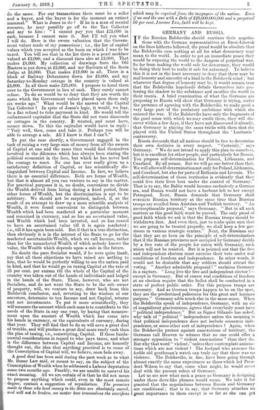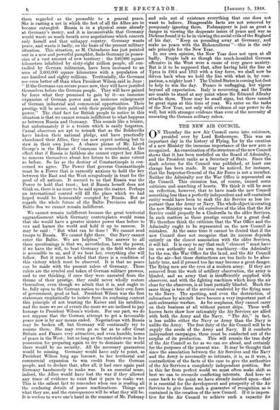GERMANY AND RUSSIA.
IF the Russian Bolsheviks should continue their negotia- tions with the German representatives at Brest-Litovsk on the lines hitherto followed, the proof would be absolute that the Bolsheviks care nothing at all for what democracy may mean to the world. In order to get an immediate peace they would be exposing the world to the dangers of perpetual war. So far from making the world safe for democracy, they would be doing their best to make it safe for autocracy. To believe this it is not in the least necessary to deny that there may be real honesty and sincerity of a kind in the Bolshevik mind ; but whatever that degree of honesty may be, it would remain true that the Bolsheviks hopelessly delude themselves into pre- ferring the shadow to the substance and sacrifice the world to their mania. A brief examination of what the Germans are proposing to Russia will show that Germany is trying, under the pretence of agreeing with the Bolsheviks, to make good a very large part of the predatory ambitions with which she entered the war. If the Bolsheviks have only the fragments of the good sense with which we may credit them, they will dis- cover within a few days, if they have not discovered it already, that Germany is playing the same tricks with them that she played with the United States throughout the Lusitania ' controversy.
Russia demands that all nations should be free to determine their own destinies in every respect. " Certainly," says Germany. " We do not intend to apply this plan to ourselves, but it is excellent for other people, and particularly for Russia. You propose self-determination for Poland, Lithuania, and Courland. By all means. But we will go one better than that. We will allow self-determination not only for Poland, Lithuania, and Courland, but also for parts of Esthonia and Livonia. The self-determination of those territories is evidently that they could live their lives best under the control of Germany.' That is to say, the Baltic would become exclusively a German sea, and Russia would not have a harbour left to her except Petrograd. Next, Russia demands that Germany shall evacuate Russian territory at the same time that Russian troops are recalled from Austrian and Turkish territory. " An unexceptionable proposal," says Germany. " But in alll such matters as this good faith must be proved. The only proof of good faith which we ask is that the Russian troops should be withdrawn first. And even then, just to make quite sure that we are going to be treated properly, we shall keep a few gar- risons in various strategic centres." Next, the Russians say that they are so keen on the principle of self-determination that if the Russian provinces now occupied by Germany decide by a free vote of the people for union with Germany, such union will not be resisted. But it is pointed out that the free and independent electors must exercise their vote under real conditions of freedom and independence. In other words, it would not be desirable that any soldiers should attend the voting. " Another admirable proposal ! " exclaims Germany in a rapture. " Long live the free and independent elector !- except in Germany. But of course real conditions of freedom at an election require that the ballot shall be conducted in a state of perfect public order. For this purpose troops are necessary. And as German troops happen to be on the spot, they are the predestined policemen for this great and humane purpose." Germany adds much else in the same sense. When the Bolsheviks speak of independence, Germany, with an air of magnificent graciousness, agrees that everybody must have " political independence." But as Signor Orlando has asked, why talk of " political " independence unless the meaning is that political independence does not include economio inde- pendence, or some other sort of independence ? Again, when the Bolsheviks protest against annexations of territory, the Germans call Heaven to witness that no one could offer a stronger opposition to violent annexations " than they do. But why that word " violent," unless they contemplate annexa- tions which are not violent ? The footpad who annexes the feeble old gentleman's watch can truly say that there was no violence. The Bolsheviks, in fine, have been going through almost exactly the same experiences as those which led Presi- dent Wilson to say that, come what might, he would never deal with the •present rulers of Germany. Let us see now what such a peace as Germany is designing under these dove-like phrases would mean. We take it for granted that the negotiations between Russia and Germany are conditional ; that is to say, that Germany attaches no great importance to them except in so far as she can get them regarded as the preamble to a general peace. She is casting a net in which the feet of all the Allies are to become entangled. Russia is in a physical sense already at Germany's mercy, and it is inconceivable that Germany would waste so much breath over negotiations which concern only herself and that unhappy country. Germany wants peace, and wants it badly, on the basis of the present military situation. This situation, as M. Cheradame has just pointed out in a new and powerful pamphlet, finds Germany in posses- sion of a vast amount of new territory ; the 540,000 square kilometres inhabited by sixty-eight million .people, all con- trolled by German militarism, have been increased to an area of 3,600,000 square kilometres with a population of one hundred and eighty millions. Territorially, the Germans are even better off than when President Wilson said in June : " If the Germans can secure peace now, they will have justified themselves before the German people. They will have gained by force what they promised to gain by it—an immense expansion of German power and an immense enlargement of German industrial and commercial opportunities. Their prestige will be secure, and with their prestige their political power." The chief fact for British people to notice in this situation is that we cannot remain indifferent to what happens as between Russia and Germany. This sounds like a truism, but unfortunately it is a truism which is easily forgotten. Casual observers are apt to remark that as the Bolsheviks have broken their national pledge, and have practically abandoned their Allies, they can now expect nothing but, to stew in their own juice. A chance phrase of Mr. Lloyd George's in the House of Commons is remembered, to the effect that if Russia is faithless she cannot expect her Allies to concern themselves about her future to the same extent as before. So far as the destiny of Constantinople is con- cerned we agree. The Power that governs Constantinople must be a Power that is earnestly anxious to hold the key between the. East and the West scrupulously in trust for the good of all nations. It seemed to us that Russia was the Power to hold that trust ; but if Russia herself does not think so, there is no more to be said upon the matter. Perhaps an international control will fill the place which we had hoped would be honourably occupied by Russia. But as regards the whole future of the Baltic Provinces and the Baltic Sea we cannot remain indifferent.
We cannot remain indifferent because the great territorial aggrandisement which Germany contemplates would mean that she would have a greater sinister power than before to vex and harass the world and hold it up to ransom. It may be said : " But what can be done ? We cannot send troops to Russia. We cannot fight there. Our Navy cannot enter the Baltic. We are helpless." The answer to all these questionings is that we, nevertheless, have the power, if we have the will, to beat Germany in the field where she is accessible to us, and if we beat her, everything else will follow. But it must be added that there is a condition of this victory which must be observed. It is that no peace can be made with the present rulers of Germany. Those rulers are the symbol and token of German military prowess, and to our thinking, if once they were unseated from the throne of their prestige, they could never wholly restore themselves, even though we admit that it is, and ought to be, fully open to the German nation to choose their own form of government, good or bad. President Wilson was the first statesman emphatically to isolate from its confusing context this principle of not trusting the Kaiser and his satellites, and the more we see of events the more we are inclined to pay homage to President Wilson's wisdom. For our part, we do not suppose that the German attempt to get a favourable peace now is by any means ended. Negotiations with Russia may be broken off, but Germany will continually try to resume them. She may even go so far as to offer Great Britain and France very attractive, and even humble, terms of peace in the West; but so long as the materials were in her possession for preparing again to try to dominate the world there would be no security. All the necessary guarantees would be missing. Germany would have only to point, as President Wilson long ago foresaw, to her territorial and commercial expansion to win credit from the German people, and to declare that, after all, it had once again paid Germany handsomely to make war. In an essential sense, indeed, the Allies would have lost the war if they allowed any trace of evidence to exist that it pays to make war. This is the salient fact to remember when one is reading all the confusing details of peace machinations. Things are what they are, and the consequences will be what they will be. It is useless to wave one's hand in the manner of Mr. Podsnap and rule out of existence everything that one does not want to believe. Disagreeable facts are not removed by pompously ignoring them. Podsnappery is just as great a danger in viewing the desperate issues of peace and war as Dickens found it to be in viewing the social evils of the England of his day. " Keep on pounding away at Germany, and make no peace with the Hohenzollern "—this is the only safe principle for the New Year. In our own opinion, the New Year does not open at all badly. People talk as though the much-heralded German offensive in the West were a cause of very grave anxiety. But is it to be supposed that, after having held the line at Ypres in 1914 and 1915 with a tiny force, we shall now be driven back when we hold the line with what is, by com- parison, a mighty host ? The United States is coming hot-foot to help to win the day. France is unflagging, her vigour beyond all expectation. Italy is recovering, and the Turks are unable to stand at any point where Sir Edmund Allenby attacks them. These may be small signs, but there cannot be great signs at this time of year. We enter on the tasks of the New Year, not only with evidence of our power to do well, but with stronger evidence than ever of the necessity of unseating the German military rulers.



































 Previous page
Previous page